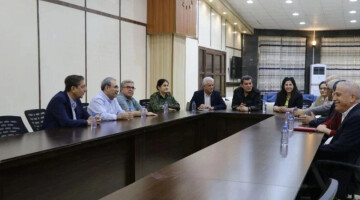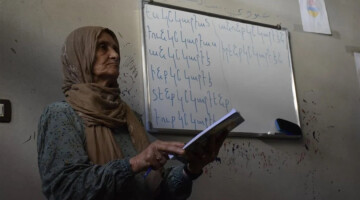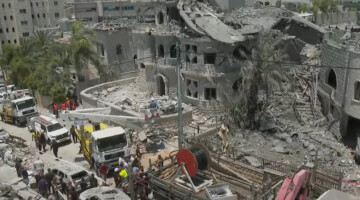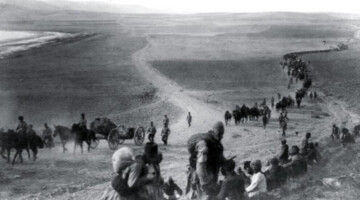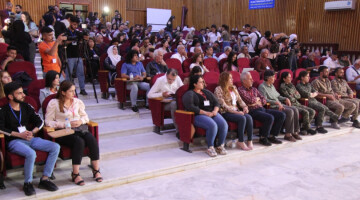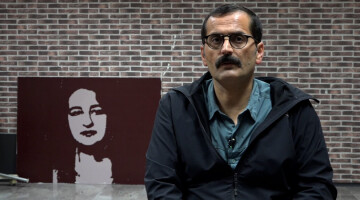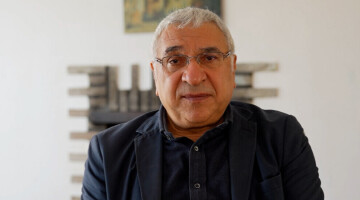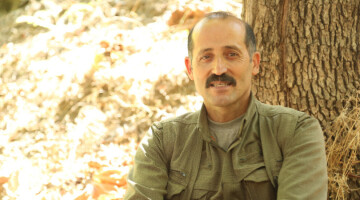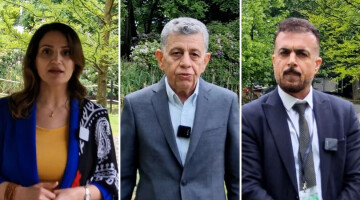On 28 January, the Center for Strategic Studies in Rojava (NLSR) held a conference on migration in Northern and Eastern Syria. Around a hundred people took part in the conference, including many Kurdish, Arab and Assyrian politicians as well as intellectuals and scientists. The debates revolved around the causes of emigration, the consequences and the possible measures to be taken. Among the speakers was Dr. Ebîr Hessaf from the Women's Council of North and East Syria.
Dr. Hessaf told ANF that the Turkish state wanted to drive out the Kurdish population with its attacks, its occupation, but also psychological warfare and embargoes and aimed to settle other population groups in the occupied areas.
Why are more and more people leaving Northern and Eastern Syria?
The problem of emigration is nothing new. The Kurdish people have been subject to pressure to emigrate for 100 years. At the end of the 20th century, people left the region in large numbers. The politics towards Northern and Eastern Syria and the political and economic crisis in Syria are causing people to leave the country. Added to this are the Turkish state's attacks on the region, the special war it is waging, psychological warfare as well as fear and hopelessness. Daily attacks began, in particular with the occupation of Afrin, Girê Spî and Serêkaniyê. The assassination attempts on prominent figures in the region are creating a climate of crisis and preventing a peaceful and stable life. This causes people to look for a better life elsewhere. Of course, it is questionable whether they can find a better life. So far, no one has ever achieved a better life by escaping from here. Nevertheless, people emigrate all over the world in search of a new life.
Which problems await Northern and Eastern Syria in connection with the emigration movement?
The most important problem is the changing demography. While more than 90 percent of the population in Western Kurdistan used to be Kurds, this percentage is different today. Towards the end of the 19th century, there was still a predominantly Kurdish population up to Deir ez-Zor. This can be proven by historical documents. But where is the Kurdish majority now? The Syrian regime has assimilated the Kurdish population by relocating them to Damascus, Aleppo, Lebanon, etc. Today, the anti-Kurdish policy, especially that of the Turkish state, aims at the de-Kurdization of Northern and Eastern Syria. Behind this is the attempt to weaken the culture, language and identity of the Kurdish people. If this policy against Western Kurdistan is not neutralized, the region and its peoples will once again be in great danger.
Migration has a direct impact on demographics. Do you think that creating pressure to emigrate is a planned policy towards Northern and Eastern Syria?
The hegemonic powers in Syria and Northern and Eastern Syria, the forces that are hostile to the Kurdish people, the dominant powers that do not accept the philosophy and paradigm of the Kurdish people, the states that do not have a democratic and liberal understanding are promoting such an emigration policy. In Northern and Eastern Syria in particular, people are being forced into emigration through a special war and the creation of a situation of permanent crisis. Under international law, attacking power plants is absolutely unacceptable. According to international conventions, it is forbidden to attack the water and electricity supplies, hospitals, schools, in short, the infrastructure of a region. The Turkish state's attacks on such facilities are aimed at causing chaos and crises in Northern and Eastern Syria. Targeting the centers of economic development means depriving the region of its breathing space. On the one hand, the borders are closed, and an economic embargo is imposed, while on the other, the border crossings are wide open for emigration. What is that supposed to mean? This special war policy aims to drive people out of the region by increasing the pressure on young people and women to migrate.
What risk does an increase in migration from Northern and Eastern Syria pose to the social, economic and political security of existence in the region?
First of all, it causes a change in the social structure. Behind the special war policy there is a state-oriented attitude. In line with this policy, the population of Northern and Eastern Syria is being pushed out onto migration routes and replaced by other population groups. Afrin, Serekaniye and Girê Spî are examples of this. Through the settlement of mercenary groups from outside in the occupied areas, the democratic, freedom and equality-oriented population was driven away from their land. This situation is not limited to the occupied territories. The structure of society changes with migration. Those who settle in place of the original population lead to a change in values in society. This is also accompanied by the loss of local values. This paves the way for the dissolution of Kurdish and local culture. The cultural fabric created by the Aramaic, Armenian, Assyrian, Kurdish and Arab populations is also being damaged, crumbling and weakening. In contrast, new cultures are being imposed on societies.
How do you assess the projects presented by the Democratic Autonomous Administration of Northern and Eastern Syria in light of this situation? What is the reaction of the population?
First of all, it must be said that this burden is too heavy for the Autonomous Administration, which is not the only one responsible here, nor is it the only one that has to find a solution to the problem of migration. It is a struggle that families, institutions and organizations, peoples, media organs and the Autonomous Administration must wage together. First and foremost, people must be convinced of the importance of change and transformation, i.e. the re-creation of society.
The peoples on whom slavery has been imposed for years must recreate themselves in the dimensions of feelings and thought. In addition, serving the people is also very important. The Autonomous Administration acts as quickly as possible to meet the needs of the people, it really does everything to respond to those needs. Despite all the embargoes and attacks, we see its efforts. Nevertheless, a strategic approach should be taken and alternatives should be constantly sought. The administration should carefully weigh the before and after and look for alternatives accordingly. Of course, the administration is also aware of the heavy war it is in. Therefore, it should have alternative strategic plans and projects. From this strategic perspective, it should give preference to projects and alternatives with long-term answers over current solutions.
What measures should be taken to stop migration?
There is no evidence to say that people who migrate are happy. One can easily leave his/her country physically, but it is not so easy to leave it mentally. Families should be made aware of the consequences of migration. The problems that arise on the path to migration and the psychological stress that begins afterward should be known. I also appeal to people who have emigrated from their country and homeland not to encourage anyone to emigrate and not to make propaganda for it. Eliminating the factors that encourage migration rather than ensuring a return to the country is also linked to the level of awareness of individuals. Migration can be prevented if people develop an awareness and sense of what it means to be connected to their country.
Is there anything else you would like to add?
A dirty war policy is being pursued against Northern and Eastern Syria. If we were able to preserve our existence despite the fragmentation of our territories by the Treaty of Lausanne, today we can also defeat the centuries-old war against identity, culture and language, i.e. the war of extermination. Efforts should focus on protection and defense. We must fight without forgetting the pain and persecution we have suffered for years, and we must fight together with the peoples against emigration and the policies of displacement.





